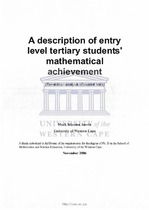| dc.description.abstract | A DESCRIPTION OF ENTRY LEVEL TERTIARY STUDENTS' MATHEMATICAL
ACHIEVEMENT
(Towards an analysis of student texts)
M.S. Jacobs
PhD Thesis, School of Mathematics and Science Education, University of the Western Cape.
This research provides insights into the mathematical achievement of a cohort of tertiary
mathematics students. The context for the study is an entry level mathematics course, set in
an engineering programme at a tertiary institution, the Cape Peninsula University of
Technology (CPUT). The participant members are first year, first semester students. The
materials for the inquiry are student produced test scores and examination scripts taken from
their entry level course.
The characteristics of the mathematical achievement of the cohort concern the understanding
of procedural and conceptual knowledge and problem solving abilities in mathematics. The
facility with mathematics is another central concern of this study as it forms the dominant
aspect of mathematical achievement which is accessible to research in the materials
employed for the study. This research also develops a mathematical achievement profile for
individual members of the cohort. The methodology makes use of content - and textual
analytic methods for profiling the students. When viewed across the different kinds of
profiling techniques adopted, this study suggests that these techniques complement one
another: the profiles developed provide a cohesive and complementary overview of the
achievement of the cohort.
111
This study challenges perceptions that responses to constructed response questions offer little
information about the mathematical knowledge of students. This study investigates the
possibilities of providing a bridge between the assessment of students by means of tests
scores and a taxonomy of mathematical objectives, on the one hand, and the critical analysis
of student produced texts, on the other. Findings suggest that diagnostic uses of paper and
pencil tests can be revealing about the achievement of students. The wide range of responses
to test items revealed a distribution of incompleteness in terms of employing algorithmic
techniques. This research revealed that even in cases of wrong solutions, participant
members' responses were reasonable, meaningful, clear and logical. The participants
responded in many ways as predicted by the research literature. Evidence could be found for
the use of child methods; poor use of reflective abstraction for coordination; accessing the
wrong cognitive frames; not seeing the underlying structure of the mathematics and treating
letters as objects.
Findings suggest that the use of a textual analytic method, which led to the creation of critical
indicators as a way of sign-posting events, enhanced the achievement profile of the students. | en_US |

